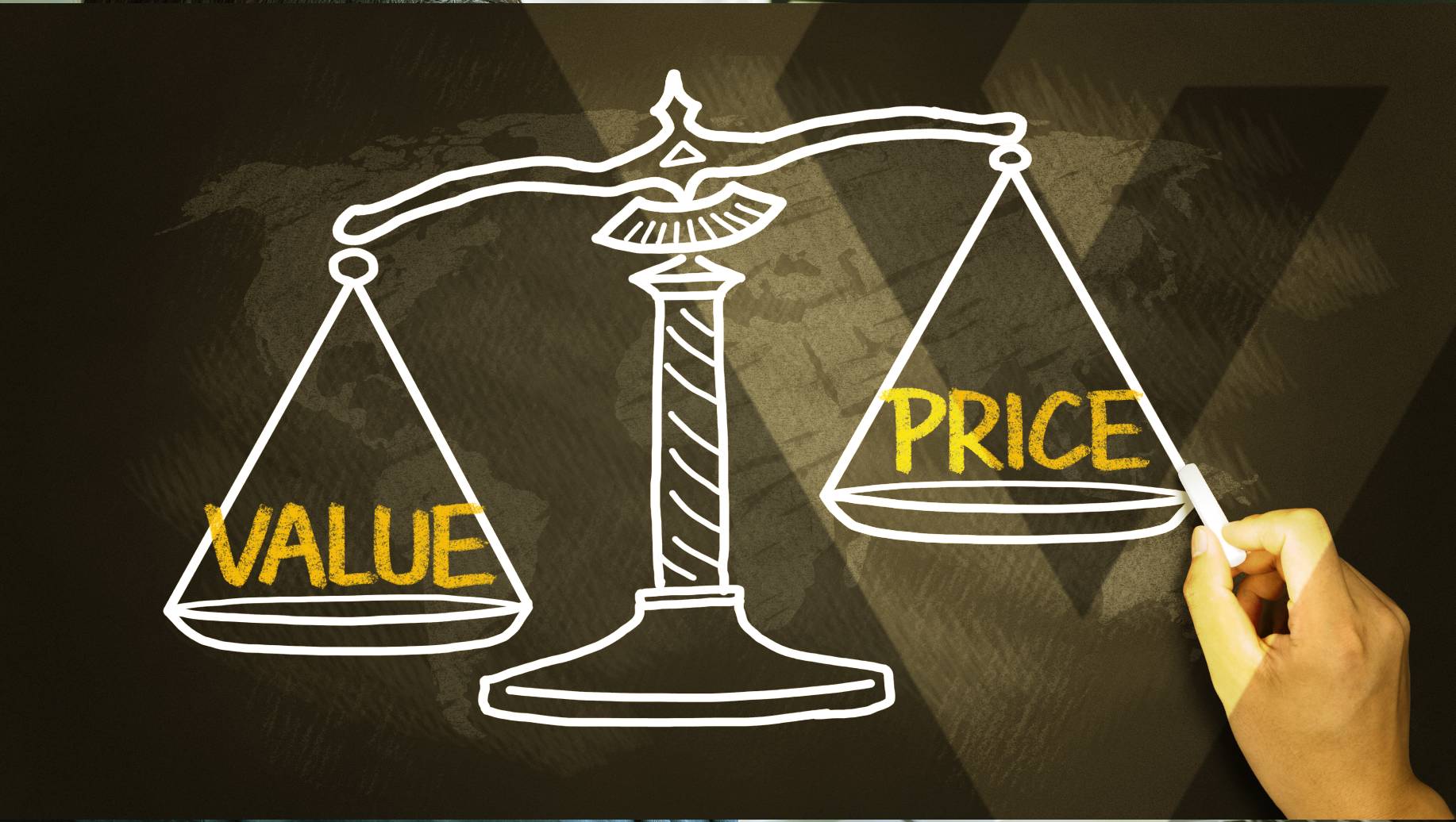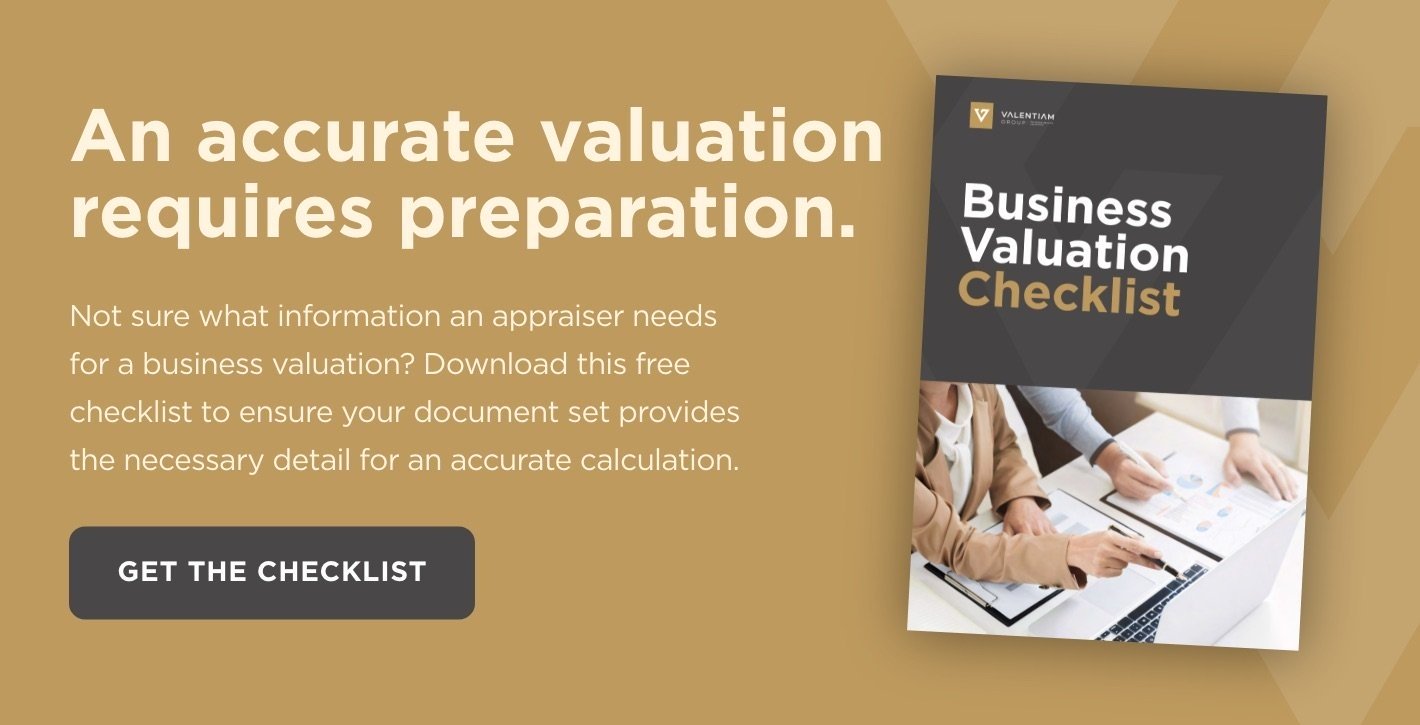4 Standards Of Value For Business Valuation - Explained
Posted by Valentiam Group on June 2, 2021

What’s the standard of value in a business valuation? Isn’t value what the business is worth, regardless of circumstance?
The answer is no in the context of a business valuation. The term standard of value by definition suggests that value is not immutable; it can vary according to perspective or circumstances. Standards of value can essentially say the same thing but the underlying assumptions of the valuation change—they establish the value of the business given a particular set of circumstances.
Most people are familiar with the fair market value (FMV) standard, but it is only one of a number of business valuation standards commonly used to establish company value. In this article, we’ll examine the four primary standards for business valuation and the contexts in which each is applied.
Download our free Business Valuation Checklist to learn about the information needed to calculate an accurate value for your business.
4 Standards Of Value & Definitions
The following are the four business valuation standards used to assess value:
-
Fair market value: Business valuations using the FMV standard appraise value from the perspective of a disinterested third party, i.e., the rational investor. The fair market value standard attempts to assess how the market perceives the value of the business in question. The FMV standard looks at value from the standpoint of a rational third-party investor, such as someone purchasing stock.
IRS Ruling 59-60 defines fair market value as “the price, expressed in terms of cash equivalents, at which property would change hands between a hypothetical willing and able buyer and a hypothetical willing and able seller, acting at arm’s length in an open and unrestricted market, when neither is under compulsion to buy or sell and when both have reasonable knowledge of the relevant facts.”
Fair market value business valuations are used to establish value for transactions, investment decisions, legal proceedings, and are the basis for almost all property tax assessments. FMV is also used in valuations for gift, estate, and income tax purposes. The FMV standard provides an indication of value but does not always provide an actual transactional (sale or purchase) value due to considerations not related to a rational investor.
-
Investment value: Sometimes referred to as strategic value, this standard of value pertains to a company’s value to a particular party or investor. The value of the business to a party such as a competitor, supplier, or customer is typically higher than it would be for a rational third-party investor due to the expectation of business synergies. Investment value varies depending on the value of the business to the specific purchaser; the business may well be more valuable to one competitor than to another, for example.
Investment value is almost always the standard used to calculate value in a merger and acquisition (M&A) transaction. Essentially, it is a value calculation based on a bet that the combined entity will be more valuable and generate more profit. The premium paid for the business over and above fair market value of the tangible and intangible assets is considered goodwill.
-
Fair value: This standard of value is usually used in an accounting or regulatory reporting context; while often it falls back on fair market value, the standards are not identical.
For example, fair value as a legal standard may, depending on the jurisdiction, be applied in shareholder dispute or marital dissolution cases. The fair value would exclude discounts for lack of marketability and lack of control to ensure that dissenting parties are not penalized for the lack of control from which the dispute arises. In addition, lack of control typically impinges on value only in the case of sale of a party’s interest in the business to a third party. Application of the fair value standard gives oppressed minority shareholders the full value of their interest in the business.
For accounting purposes, fair value is used for reporting asset values in alignment with Generally Accepted Accounting Practices (GAAP). In M&A transactions, the fair value standard is used to allocate purchase prices by the acquiring company.
-
Liquidation value: The other standards of value are all going concern values, based on the premise that the business will continue operation, either independently or as a part of an acquiring company. A distressed business is obviously worth less than a desirable, healthy asset. As a result, liquidation value will look at value from the context of the business being terminated..
The assumptions for calculation of liquidation value are fundamentally different from those for going concerns. Typically, the business will not have enough cash flows to pay their operating expenses or debt obligations and face bankruptcy or dissolution. However, distressed companies can have valuable intellectual property (IP). The value of IP can include customers, patents, trademarks and copyrights. The value of the assets will be based on a quick sale and in a piecemeal disposition. It is also possible that the assets will have no value as the cost of removing or transferring assets can be higher than what the value actually is.
Each of these four business valuation standards will result in a different number to represent the value of the business, depending on the circumstance. That variation reflects value under the different scenarios according to which standard is applied and attempts to reflect value as a function of circumstance or to a particular owner or purchaser.
Just as liquidation value would be an inappropriate metric to apply to a going concern to establish value for an M&A transaction, fair market value may be inadequate to reflect value in cases of shareholder disputes where the interests of an oppressed minority would be devalued by the application of discounts for lack of control and marketability. The different standards of value allow these variations in circumstance to be taken into account to establish a more accurate value for the business under each scenario.
Business valuation specialists are experienced in the application of each of the standards of value and the appropriate context for their uses. In a business valuation, the first question a valuation expert will seek to answer is the purpose for the valuation. Through application of the rules of thumb for business valuation, a professional appraiser will establish the correct standard of value for the circumstances at hand.
Need help determining the value of your business?
Valentiam has helped companies in a variety of industries attain accurate enterprise and asset valuations. We have extensive experience in the application of all valuation methods for a broad range of businesses and situations. Our valuation and transfer pricing specialists have worked with some of the largest companies in the world.
Contact us to see how we can help your company with your valuation and transfer pricing needs.
Topics: Business valuation
Related Posts
EBITDA Multiples By Industry: An Analysis
EBITDA multiples by industry indicate growth, profitability, and stability of profits in various sectors—and are a quick and easy way to estimate value.
Valuation Methods: A Guide
Different types of business valuation methods are suited to specific needs. Here are the three primary types of valuation techniques and when they should be used.


